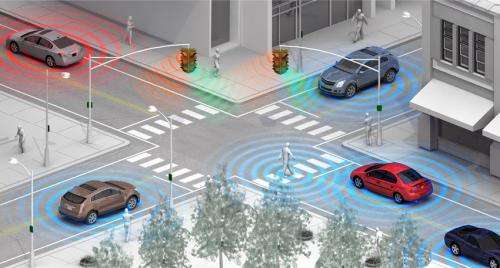July 27, 2012 report
GM working on Wi-Fi Direct application to prevent vehicle/pedestrian accidents

(Phys.org) -- General Motors has announced that it is working on a way to use Wi-Fi Direct to alert drivers to the presence of pedestrians so as to avoid running over them. Wi-Fi Direct is a new technology that is beginning to be implemented into many new smart phones that allows the phones to communicate with one another directly, i.e. without the need for a hot spot, cell tower etc. GM had previously announced it was looking into using the technology to allow cars to communicate with one another so that the system could alert driver’s to slow-downs, accidents or road hazards.
The big advantage of Wi-Fi Direct is the time it takes for two devices to connect; just one second. Conventional systems take seven or eight. Since the technology works for up to 600 feet, drivers would get ample warning of the presence of a pedestrian, allowing for evasive action.
GM is clearly betting that Wi-Fi Direct will become mainstream over the next few years and wants to take advantage of the facilities it offers. They envision creating specific apps for those most at risk of being run over while going about their jobs, such as bike messengers or construction workers, but also want to take advantage of the signals that are emitted from cell phones regardless of whether its owner is running any specific app. In this scenario, technology in the car would simply recognize that a cell phone was operating in the nearby vicinity. A major hurdle for the company will be recognizing the difference between cell phones being carried by pedestrians versus those that are inside of other vehicles.
GM also says it is looking to integrate the new technology with others such as those that rely on radar or infrared vision sensors to create cars of the future that are as safe as humans are able to make them.
With the announcement, GM is offering a peek into the future; one where Wi-Fi Direct becomes omnipresent. Where cars, people, buildings, bicycles and all manner of devices constantly emit signals to the world at large, advertising their presence, or more intelligently, what they have to offer. In such a world, everyone would be kept apprised of the existence of everyone and everything else around them, with personalized filters, of course and everyone would hopefully, be the better for it.
More information: Press release
© 2012 Phys.org



















